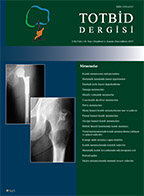
Renal cell carcinomas (RCC) are a group of malignant tumors originating from the epithelium of the renal tubules. This group covers 3% of all adult carcinomas, the most common malignant tumor (90%) of the kidney, and 5-year survival rate is 45%. Bone metastasis is the second most common metastasis site, and bone metastasis is seen in 30% of metastatic RCCs. In the bone, RCC most commonly metastasizes to the spine, pelvis, and proximal femur. The fact that RCC is resistant to chemotherapy and radiotherapy, and the response to immunotherapy alone can be achieved in only 5–10% of patients, has led to the emergence of targeted therapies. The main target in treatment is prevention of symptoms such as nerve compression, fracture and hypercalcemia, palliation of pain, and increasing the quality of life. Nephrectomy is recommended in patients with metastatic RCC due to pain, hypercalcemia, hypertension, and erythrocytosis. In the absence of pathological fracture, a wide resection with clear margins should be performed for a solitary metastasis. If there is multiple metastasis in the bone, surgery should be considered only to reduce the risk of fractures, to detect pathological fractures, emergent spinal decompression, and to reduce spinal instability.
In conclusion, the incidence of metastatic RCC increases with prolonged survival due to targeted therapies. Skeletal related events (SRE) and associated complications are seen in 85% of the cases. These symptoms cause economic burden, decrease quality of life, and increase morbidity and mortality rates. However, it should be kept in mind that resection of the primary tumor and solitary metastasis may lead to a longer life in the case of solitary metastasis. Besides, wide resection of a metastasis can be performed as a palliative treatment in large lesions, progressive bone destruction, uncontrolled pain, instability, and to prevent fractures.